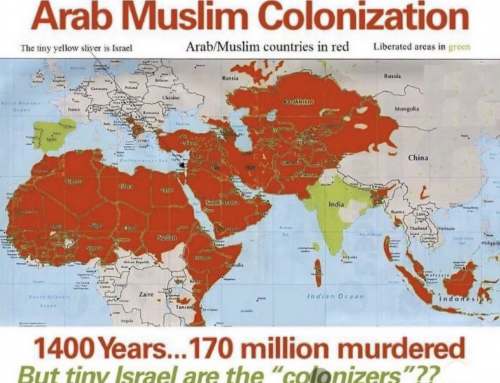There are no Asian, European or African countries that have been colonized by Jews. Throughout history, Jewish communities have existed in various parts of Asia, Europe and Africa, but they have not been involved in colonial endeavours or established colonies that governed over native populations.
It’s worth noting that Jewish people have faced persecution and marginalization throughout history, including in Europe and Asia. In some cases, Jewish communities have been forced to flee or have been subjected to violence and discrimination.
on the other hand and by contrast:
So you think Israel is a colonial project?
Stand corrected. Islam IS a colonial project as EVIDENCED by the following information.
I can only present well reasoned, rational and logical arguments substantiated by verifyable historical evidentiary facts. I can not make people rational, reasonable, logical, intelligent, erudite, sensible, fair minded or lucid on such matters.
Islam has colonized various African countries through military conquests, trade, and cultural exchange. Here’s an overview:
North Africa
– Libya: Arab Muslim forces took control of Tripolitania in 647 AD, marking the beginning of Islamic influence.
– Tunisia: The city of Kairouan was established as a base for further operations in 670 AD.
– Algeria: Musa’s forces took Algiers in 700 AD.
– Morocco: Uqba ibn Nafi’s conquests reached the western edge of the Maghreb.
East Africa
– Sudan: Arab-Muslims moved deeper into Sudan over centuries, with the Arab-Muslim conquerors occupying Egypt as far as Aswan in 641 AD.
– Ethiopia and Eritrea: Islam spread peacefully in the 7th century, with early Muslim refugees seeking asylum in the Kingdom of Aksum.
– Somalia: Islam was introduced through trade and cultural exchange with Arab and Persian traders.
West Africa
– Nigeria: Islam was consolidated in northern Nigeria under British colonial rule, with the British protecting Islamic practices.
– Ghana: Muslims formed a protective association in 1932 to safeguard their interests.
– Mali: The Mali Empire was a major Islamic power in West Africa from the 13th to 17th centuries.
– Senegal and Gambia: The Almoravid dynasty, a reformist Islamic movement, emerged in the 11th century.
Southern Africa
– South Africa: Islam was introduced by Indian Muslims and Ismaili Muslims from East Africa.
– Mozambique: Islam was present in the region due to trade and cultural exchange.
Other regions
– Chad: The Kanem-Bornu Empire, a major Islamic power, existed from the 8th to 19th centuries.
Some key factors contributing to the spread of Islam in Africa include:
– Military conquests: Arab Muslim forces expanded Islamic rule through military campaigns.
– Trade routes: The Trans-Saharan Trade Routes and coastal trade networks facilitated cultural exchange and the spread of Islam.
– Cultural exchange: Islam spread through peaceful interactions and cultural exchange between African kingdoms and Islamic traders and scholars. The methods of conversion have always been highly coercive, however.
list of African countries that have been colonized by Israel:
There are no African countries that have been colonized by Israel. NONE. Israel has not colonized any African countries.
However, Israel has had diplomatic and economic relations with several African countries, and has provided aid and assistance to some nations.
Here’s an expanded list of Asian countries or regions with significant Islamic influence or history:
Southeast Asia
– Indonesia: Islam was introduced in the 13th century and became a major influence in the region.
– Malaysia: Islam was introduced in the 14th century and spread throughout the Malay Peninsula.
– Brunei: The country has a long history of Islamic influence and is currently an Islamic state.
– Southern Philippines: Islam was introduced in the 14th century and has had a significant impact on the region’s culture.
– Southern Thailand: Islam has a significant presence in the southern provinces of Thailand.
– Cambodia: Islam has a significant presence in the country, particularly among the Cham Muslim minority.
– Myanmar (Burma): Islam has a significant presence in the country, particularly among the Rohingya Muslim minority.
South Asia
– Pakistan: The region was conquered by Muslim armies in the 8th century and later became a major center of Islamic culture.
– Bangladesh: Islam was introduced in the 13th century and became a major influence in the region.
– India: Islam was introduced in the 7th century and had a significant impact on Indian culture, particularly in the northern regions.
– Sri Lanka: Islam has a significant presence in the country, particularly in the eastern and western coastal regions.
– Nepal: Islam has a significant presence in the country, particularly in the Terai region.
– Bhutan: Islam has a small but significant presence in the country.
Central Asia
– Afghanistan: Islam was introduced in the 7th century and the region became a major center of Islamic culture.
– Uzbekistan: The region was conquered by Arab armies in the 8th century and became a major center of Islamic learning and culture.
– Tajikistan: Islam was introduced in the 8th century and has had a significant impact on the region’s culture.
– Kyrgyzstan: Islam was introduced in the 8th century and has had a significant impact on the region’s culture.
– Kazakhstan: Islam was introduced in the 8th century and has had a significant impact on the region’s culture.
– Turkmenistan: Islam was introduced in the 7th century and has had a significant impact on the region’s culture.
West Asia
– Turkey: The region was the center of the Ottoman Empire, which was a major Islamic power from the 14th to the 20th centuries.
– Iran: Islam was introduced in the 7th century and the region became a major center of Islamic culture.
– Iraq: Islam was introduced in the 7th century and the region became a major center of Islamic culture.
– Saudi Arabia: Islam was founded in the 7th century and the region has been a major center of Islamic culture and learning.
– Yemen: Islam was introduced in the 7th century and the region has been a major center of Islamic culture and learning.
– Oman: Islam was introduced in the 7th century and the region has been a major center of Islamic culture and trade.
– United Arab Emirates: Islam was introduced in the 7th century and the region has been a major center of Islamic culture and trade.
– Qatar: Islam was introduced in the 7th century and the region has been a major center of Islamic culture and trade.
– Bahrain: Islam was introduced in the 7th century and the region has been a major center of Islamic culture and trade.
– Kuwait: Islam was introduced in the 7th century and the region has been a major center of Islamic culture and trade.
– Jordan: Islam was introduced in the 7th century and the region has been a major center of Islamic culture and learning.
– Lebanon: Islam has a significant presence in the country, particularly in the northern and eastern regions.
– Syria: Islam was introduced in the 7th century and the region has been a major center of Islamic culture and learning.
– Palestine: Islam was introduced in the 7th century and the region has been a major center of Islamic culture and learning.
East Asia
– China: Islam has a significant presence in the country, particularly in the western regions of Xinjiang and Ningxia.
Other regions
– Kashmir: A disputed region in the Indian subcontinent with a significant Muslim population.
– Xinjiang’s neighboring regions: Other regions in Central Asia and China that have historical and cultural ties to Islam.
This expanded list includes more countries and regions with significant Islamic influence or history. However, it’s still not exhaustive, and there may be other regions or communities that could be included.
There are no Asian countries that have been colonized by Jews. Historically, Jewish communities have existed in various parts of Asia, such as India, China, and the Middle East, but they have not been involved in colonial endeavors.
While there have been instances of Jewish migration and settlement in various parts of the world, including Asia, these movements have not typically been driven by a desire for colonial expansion or domination.
There are no Asian or European countries that have been colonized by Jews. Throughout history, Jewish communities have existed in various parts of Asia and Europe, but they have not been involved in colonial endeavors or established colonies that governed over native populations.
It’s worth noting that Jewish people have faced persecution and marginalization throughout history, including in Europe and Asia. In some cases, Jewish communities have been forced to flee or have been subjected to violence and discrimination.
Colonization of Europe by Islam historically
Historically, several European regions were conquered or influenced by Islamic forces, particularly during the expansion of the Islamic Caliphates and the Ottoman Empire. Here are some examples:
– Spain (Al-Andalus): Conquered by Muslim Moors in the 8th century, Islamic rule lasted for nearly 800 years.
– Portugal: Parts of Portugal were under Islamic rule during the Moorish occupation of the Iberian Peninsula.
– Sicily: Conquered by Arab Muslims in the 9th century, Islamic rule lasted for over a century.
– Crete: Conquered by Arab Muslims in the 9th century, Islamic rule lasted for over a century.
– Malta: Conquered by Arab Muslims in the 9th century, Islamic rule lasted for over two centuries.
– Balkans: Various parts of the Balkans, including modern-day Albania, Bosnia and Herzegovina, Bulgaria, Kosovo, Macedonia, Montenegro, and parts of Serbia, were conquered by the Ottoman Empire in the 14th to 16th centuries.
These regions were under Islamic rule for varying periods, and their cultures and architectures reflect the influences of Islamic civilization.
addendum:
Case study: Mauritania
Mauritania has a significant Islamic heritage and history. Islam was introduced to the region in the 8th century, and it played a crucial role in shaping the country’s culture, society, and politics.
Early Islamic Influence
– Islam arrived in Mauritania in the 8th century, brought by Muslim traders and scholars from North Africa.
– The local population gradually adopted Islam, and it became an integral part of Mauritanian culture and identity.
Almoravid Empire
– In the 11th century, Mauritania was part of the Almoravid Empire, a powerful Islamic state that spanned parts of West Africa and the Iberian Peninsula.
– The Almoravids played a significant role in spreading Islam throughout the region and promoting Islamic learning and culture.
Islamic Traditions
– Mauritania has a strong tradition of Islamic scholarship and learning, with many Islamic schools and universities throughout the country.
– Sufism has also had a significant influence on Mauritanian Islam, with many Sufi orders and traditions present in the country.
Modern-Day Islam in Mauritania
– Islam is the state religion of Mauritania, and the country’s laws and institutions are based on Islamic principles.
– The majority of the population practices Sunni Islam, and Islamic practices and traditions play an essential role in daily life.
Overall, Islam has had a profound impact on Mauritania’s history, culture, and identity, shaping the country’s development and informing its values and traditions.
Slavery remains a significant issue in Mauritania, despite the country’s efforts to eradicate it. Here’s a breakdown of the situation:
Prevalence: The Global Slavery Index estimated that there were approximately 90,000 people living in slavery in Mauritania in 2018, which is about 2.1% of the population. More recent estimates suggest that there are around 149,000 people enslaved in Mauritania as of 2023.
Forms of Slavery: Slavery in Mauritania primarily takes the form of chattel slavery, where slaves are considered the property of their masters. Slaves can be bought, sold, rented out, or given away as gifts. Women and children are disproportionately affected, with many being forced into domestic servitude or labor.
Government Response: The Mauritanian government has taken steps to address slavery, including passing laws to criminalize the practice. In 2007, the government passed a law allowing slaveholders to be prosecuted, and in 2015, it expanded the definition of slavery to include child labor. Recently, a specialized court was established to prosecute cases of slavery, human trafficking, and migrant smuggling.
Challenges: Despite these efforts, enforcement remains weak, and many anti-slavery activists face harassment and arrest. The government’s official position is that slavery is “totally finished,” but many argue that this is not reflected in reality.
Activism: Anti-slavery activists, such as Biram Dah Abeid, continue to advocate for stronger action to combat slavery. Abeid has faced persecution for his work, but he remains committed to fighting for the rights of enslaved people.
Overall, while progress has been made in addressing slavery in Mauritania, much work remains to be done to ensure that the practice is truly eradicated.
adendum 2: Slavery in current Islamic regimes
Slavery still exists in various forms around the world, affecting different countries and regions. Some nations with significant Islamic populations struggle with modern slavery. Here are some countries where slavery persists:
Countries with Significant Slavery Issues:
– Mauritania: Despite abolishing slavery in 1981, it’s estimated that between 30,000 to 680,000 people live in slavery, with many being born into it. The country’s social structure reinforces slavery, with lighter-skinned Arabs ruling over darker-skinned Africans.
– Sudan: The Second Sudanese Civil War led to widespread enslavement, with estimates suggesting up to 35,000 black slaves remain in the north. Slaves are often abducted, beaten, and forced into labor or domestic servitude.
– Algeria and Libya: Migrants fleeing to Europe are vulnerable to enslavement, with an estimated 106,000 black Africans enslaved in Algeria. Women and children are often forced into sex trafficking or domestic servitude.
– Saudi Arabia: Despite abolishing slavery in 1962, modern slavery persists, with an estimated 740,000 people living in slavery. Many are migrant workers subjected to forced labor or domestic servitude.
– Other Countries: Other nations, such as Yemen, Iraq, Jordan, Lebanon, and the United Arab Emirates, also struggle with modern slavery, often in the form of forced labor, sex trafficking, or child marriage.
Note that all of these countries that maintain and largely condone and practice slavery are Muslim majority countries. This is no co-incidence; Islam is inherently authoritarian and slavish from the time of its foundations. The word Islam means submission in Arabic.








